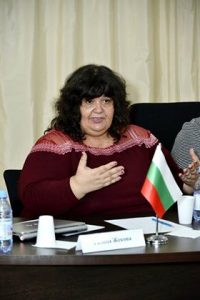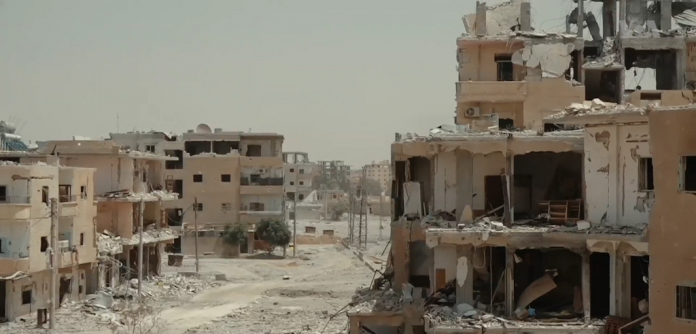The women of ISIS have been a problem. The UK and other member states have been reluctant to repatriate women who lived in Syria and Iraq, often convinced they were serving a greater cause. There are not many studies on who these women really are.
Professor Tatyana Dronzina is a a member of the Advisory Board of the TACTICS Institute for Counter-Terrorism Studies. Rather than pursuing a “reflective” couch-desk-top approach to the study of terrorism, she has an immersive approach, having lived in radicalised communities and interviewed individuals who will use political violence. She calls them terrorists.
She is often in field work in the Balkans and, often, Central Asia. She is a full professor at the Department of Political Science of St Kliment Ohridski University of Sofia and a Guest Lecturer at Carlos III University (Madrid) and Granada University.
Talking about women as political agents in counter-terrorism discourse must surely be the beginning of a democratic debate on what happens to the women of ISIS, our women of ISIS.
European Interest: We tend to think of radical Islam as disempowering for women. Why did so many women from EU member states and Central Asia travel to Syria and Iraq to joins ISIS? Do we know how many they were?
Tatyana Dronzina: The motives of different women joining ISIS differ, just as the motivation of individual men. That is what happens in any significant movement of motivated migration, from the Spanish Civil War to the mujahedeen in Bosnia and Hercegovina. Apart from individual differences, there is regional differentiation, cultural and broadly environmental, that affects the appeal of the ISIS message. Most women joining ISIS from Central Asia followed their husbands rather than committing ideologically to the cause. During my fieldwork in Kazakhstan and Kirgizstan, I often asked the extended families if their daughters in law didn’t protest the decision to leave with the children. Almost always, I got the same answer: “She was never given the floor.” My conclusion is that patriarchy disempowers women, striping them from “managerial-level” decision making in the family as much as in the public sphere. It is profoundly illusory to think that women in patriarchal societies are “queens” of the house, as intentionally disseminated in the media.
Concerning radical Islam, I cannot say that it always disempowers women. Let me first say that I do not equate empowerment with either gender equality or with more respect for women’s rights, as we automatically do in the West. My argument is that in countries dominated by radical interpretations of Islam, women could be given new roles or newly interpreted roles, which are robust but still “functionally aligned” with the demands of a patriarchal context.
Let me offer a few examples: in Saudi Arabia, a woman will never be armed and will never participate in Islamic law enforcement units known as Al Khansa; in the Califate, they were actually part of such brigades. In any Islamic society, women are housekeepers, wives and mothers. In the Islamic State, they are wives of mujahedeen and mothers of the next generation of jihadi fighters. These are significant differences, are they not?
My argument is that in countries dominated by radical interpretations of Islam, women could be given new roles or newly interpreted roles, which are robust but still “functionally aligned” with the demands of a patriarchal context
The great tragedy is that women get new roles, but not new rights. Despite the hardship they endure to join a “state” governed by a medieval and oppressive interpretation of Islam, there is no term that can adequately describe this paradoxical ideological commitment. But that is undoubtedly not feminism.
What was the role of women in the Islamic State dystopia? How one can define “radicalisation” for women? Women are not Jihadi fighters, are they?
At the time of its physical (territorial) existence, the Islamic State showed a notable evolution in how it viewed women. Since the very beginning, women were treated as a strategic resource. In its pretence to being a state, like every state, ISIS emerged as an advocate of a particular family unit that required women. One of the dominant messages of ISIS was that “The Califate is the only place in the world when your female Muslim identity will flourish; it will not be distorted as in the West.”
On the other hand, there was a message for men, who were told that IS was countering a regime of ‘gender disorder” in the West, where men were neither understood nor their authority accepted. “Come here where nothing and nobody will question your power and authority” was the message.
During interviews with returnees to Central Asia, I was often told that men were motivated by the idea of showing solidarity to “Muslim brothers”, but I also registered a desire to live in a utopian Sharia regime, “where no one will question my manhood.” In the Islamic, State women were allowed to practice two professions: teachers and medics. Often, the ISIS regime took pride in its perfectly gender-segregated health system.
At the same time, there were hundreds of dedicated female Public Relations activists, whose role was to recruit and crowdfund and mobilise. Even now, when the physical Caliphate has been defeated, I am not sure we have won the information war.

“During interviews with returnees to Central Asia, I was often told that men were motivated by the idea of showing solidarity to ‘Muslim brothers’, but I also registered a desire to live in a utopian Sharia regime, ‘where no one will question my manhood’,” says Prod. Tatyana Dronzina.
When ISIS forces started to retreat in 2017, there is evidence to suggest that women were eventually allowed to join military regiments and prepared for suicide missions. I didn’t find definitive proof of this phenomenon, but it cannot be denied that many “local” affiliates of terrorist networks have started using female suicide bombers. There were two primary drivers for this development: first, the ranks of men were thinning due to armed conflict and, secondly, because a female suicide act has a more symbolically powerful impact on non-mobilised men. “If I, a woman, sacrifice myself, why you, a man, don’t do the same?”
I suppose that the Islamic state regrouped, scaling down from a proto-state to more traditional terrorist network, “sticking to tradition” so to speak, so as not to alienate male fighters.
Following the IS military defeat, most of the foreign terrorist fighters were arrested in Syria and Iraq and put in jail. What do we know about the women and the children in the Al Hol and Roj camps?
Let me first say that we call them camps, but it would be more appropriate to refer to them as “custodial structures for the women and children of foreign fighters.” These are run by Kurds, who have no professionally trained staff and, during the Turkish operation in Syria, they had to redeploy much of this personnel to the front line. Both camps have only basic infrastructure that can hardly accommodate the needs of the population there, and we should be talking about a humanitarian crisis.
Because the Kurdish forces do not represent a state, other governments avoid engaging with them directly to prevent legitimising their claim to territory. Therefore, even the EU has been reluctant to channel aid towards Kurdish authorities or engage directly to negotiate the repatriation of their citizens.
There are several challenges we are not dealing with. In Al Hol, we have the cohabitation of women that were never radicalised with women who still profess their loyalty to ISIS. In one of the video messages of the executed leader Omar al Bagdadi, a big part of his speech was reserved for his female followers in that specific camp. It is said that ISIS military operatives have attempted to help their female following in the camp to reconstruct the structure of ISIS everyday life. Kurdish authorities in Al Hol suggest there is a hidden network of radicalised women, headed by an emira, who also heads the clandestine sharia court in the camp and sentences women who are suspected of cooperating with the camp’s authorities or talk to journalists. As a result, dead bodies of those women have been found, and several tents have been put ablaze without any chance of discovering who the perpetrators were.
Is repatriation of women a threat to national security? Should we repatriate, the children educated and socialised in dystopian conditions, with different values and exposed to violence.
The repatriation of women is a threat because some were never de-radicalised. The same should be said about male foreign fighters. Under these conditions, should they be repatriated? My answer is yes.
The repatriation of women is a threat because some were never de-radicalised. The same should be said about male foreign fighters. Under these conditions, should they be repatriated? My answer is yes… Is it dangerous for the respective societies? “Yes, it is,” I would argue. Still, it is more dangerous to leave them in Iraq and Syria, that is, counties without the resources required to design and implement elaborate de-radicalisation programs
Is it dangerous for the respective societies? “Yes, it is,” I would argue. Still, it is more dangerous to leave them in Iraq and Syria, that is, counties without the resources required to design and implement elaborate de-radicalisation programs. After all, local people suffered a lot from foreign fighters, which is testing the compassion they are willing to extend to the wives and children of these very fighters.
Worse yet, leaving these radicalised men on-site creates an environment conducive to the radicalisation of children, boys and girls. The phenomenon of child soldiers is not new. There precedents in Sierra Leone, Sri Lanka, etc., and jihadis know how to work with them.
How would you frame the moral dilemma around the question of repatriation?
The first legal dilemma is the fact that western governments fear that a system of enhanced protection for individual civic rights will make sentencing unlikely, particularly for women. This lack of confidence in the rule of law not only undermines public consciousness but could be seen in-and-of-itself as contributing to radicalisation.
Then there is the operational challenge for democratic governments of organising and executing an operation for the evacuation of their citizens, bearing the brunt of public criticism. The question for the average Bulgarian, British or Belgian is why would we risk lives to protect people that have betrayed our values. Making a case for repatriation as a political leader is not easy.
Finally, it is true that children do not bear responsibility for their parent’s choices and cannot be proclaimed guilty by association. But it cannot be denied that some nine or sixteen-year-old children may be accomplished killers. Could they be de-radicalised at all?
In my view, we don’t know.
What about the wives that just followed their husbands – an unconditional – or should they be sentenced? Are they guilty? Many people would proclaim them innocent. But voices are heard that if ISIS didn’t suffer a military defeat, the same women would not extend their solidarity to other hurting women and children.
Up to now, very few counties have carried out repatriation operations: among them, Russia, Uzbekistan, Malaysia, Kazakhstan, and Tajikistan. There is little care for a joint, coordinated and sophisticated political strategy of what happens to returnees. I recall the written testimony of a Central Asian female dissident – now a refugee in an EU member state – who made the following observation:
“You sent an aircraft to pick up people who have committed the most terrible among crimes: terrorism. But you will never send an aircraft to pick up the dissidents of your country living now in Europe, whose only fault is that they do not agree with you.”

